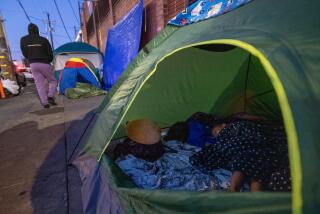A Sharp, Beneficial Focus
The Stewart B. McKinney Homeless Assistance Act, passed by Congress in 1987, governs how Washington doles out more than $1 billion each year to local groups helping the indigent. Last month, the Bush administration suggested that the focus of the act be narrowed to a sharply defined population: the people who chronically live on city and suburban sidewalks, under bridges and in temporary shelters, most of whom suffer from mental illnesses, drug addictions or both. Last week the administration put a deadline on moving these people off the streets and into productive lives: 10 years. It’s a noble goal and it can be met.
In a reflection of the bitter political infighting that keeps so many of this nation’s streets looking like open-air asylums, the National Coalition on Homelessness dismissed the administration’s policy as “misguided” for failing to portray homelessness “as primarily an economic condition, not a medical condition.” It is certainly true that in this rich nation there are far too many poor people for whom decent housing is all but impossible to find. But today, when budget deficits are leading states to slash social services, the McKinney Act simply cannot afford to cure all social ills. The coalition should keep fighting for money to build housing for poor people, but the administration should reject its insistence that the McKinney Act provide the bankroll.
When people are allowed to stake out public sidewalks as places to sleep, smoke crack and scream at imagined demons, communities’ resolve turns to hopelessness. The cynicism that follows can infect a nation. The Bush administration’s still-fresh resolve is evidenced in its appointment of Philip Mangano, a 54-year-old former Hollywood music executive, to coordinate initiatives now strewn across 15 federal agencies. If Mangano is as smart as his record as an advocate for the homeless in Massachusetts suggests, he’ll find plenty of places to trim wasted cash and bureaucracy. He’ll also see that it would be a mistake to fix parts of the McKinney Act that aren’t broken.
For instance, officials of the Department of Housing and Urban Development, which oversees implementation of the act, argue that they should concentrate only on their “core mission”: housing. But studies have shown that the act is successful--and economical--precisely because it offers not just a bed but counseling, job training and other “supportive services” that can help people stay off the streets.
Also questionable is the administration’s suggestion that money be distributed not to agencies that have proved themselves effective, as is now the case, but be based on an area’s average income. Santa Monica, with lots of rich people to balance out its penniless street dwellers, could suffer. And money meant to move mentally ill or substance-abusing people into apartments and jobs could get diverted by small-town politicians obsessed with potholes.
The term “homeless” has grown so fuzzy that it might as well be scrapped. But the McKinney Act’s original vision of easing people off the street and into productive lives by encouraging self-sufficiency has never been more important.
More to Read
Sign up for Essential California
The most important California stories and recommendations in your inbox every morning.
You may occasionally receive promotional content from the Los Angeles Times.










